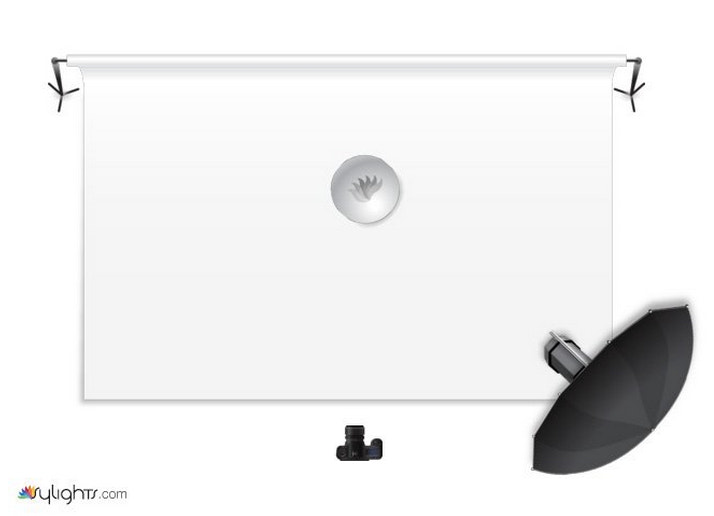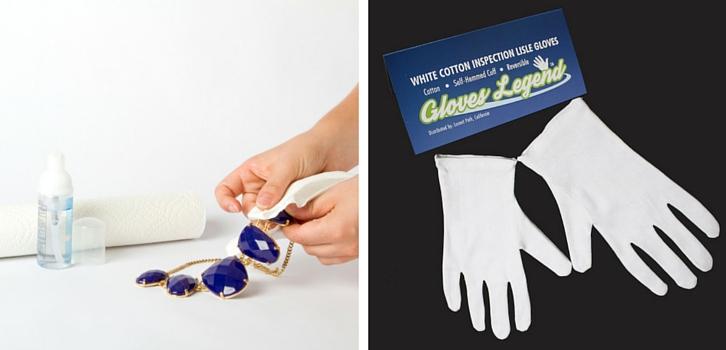A Behind-the-Scenes Look at Jewelry Photography With Expert Sarah Pflug
Your product images can make or break the success of your jewelry business.
If shoppers can’t see detailed jewelry images on your website, how else will you convince them to buy?
It’s true that photographing jewelry is a challenge. You need to avoid reflections and smudges. Manipulate lighting. Set your shutter speed and aperture a certain way. It can get real confusing, real fast.
This guide will walk you through tips on preparation, lighting, positioning, and editing photos—so it looks like you hired a professional.
Become a DIY professional jewelry photographer ?
Shopify Academy Course: Product Photography
Photographer Jeff Delacruz shares how you can create your own photo studio and take beautiful product photos for less than $50.
Jewelry photography equipment
The photography equipment you use will depend on your budget. You can keep costs minimal if you buy a few of the items below. Or you can buy more expensive gear like lighting or displays for your jewelry.
Here’s some of the basic jewelry photography equipment you’ll want to have:
Camera
The truth is, you don’t need the most expensive camera to take photos of your jewelry. New jewelry store owners can execute a shoot with an iPhone or Android, too. If you have a smartphone handy, use it. If you already own a DSLR with a nice camera lens, you can use that.

If you’re planning to buy a new camera, read this thread on Quora that discusses the best cameras for product photography.
Tripod
If you handhold your camera, it won’t matter what lighting setup you use. Handholding your camera or smartphone will almost definitely result in camera shake. Neither is a desirable situation.

Always use a tripod. Tripods are cheap, effective, and improve both quality and consistency. When your camera is held steady by a tripod, you can use optimal aperture and ISO settings. Mark a spot on the floor for your tripod and it will be easy to replicate your setup, even when shooting on different days.
Lighting source
Light is necessary to take photos of your jewelry. A room with windows next to a wall is a good option. The bigger the window, the more light you’ll get. If you don’t have natural lighting, you could buy artificial light sources, like a softbox.
You can find photography lighting kits on Amazon. Don’t get caught up in all the reflectors and LED lights right away. Keep your setup simple. After you’re familiar with the camera, you can try different lighting tactics in your photoshoots.
Table
A standard folding table works best. Look for one with a width between 24 and 27 inches.
White background
There are many different ways to create a white background for your shoots. If you plan to take a lot of different photos, consider buying a white paper sweep.

Paper sweeps are big rolls of paper you use to create a white or colored background. If the sweep gets dirty, simply cut the dirty piece off and roll out a clean section. The alternative to sweeps is poster board, which you can find at your local drug store or online for cheap.
Foam boards
There’s always a shadow side when shooting product photography. It’s usually too dark to produce a good image. You can place a white foam board to reflect light back into the shadow to brighten it up.

Clamps or tape
You’ll want tape or clamps to keep your foam boards and sweeps in place when shooting on a table.


Free Guide: DIY Product Photography
Learn how to take beautiful product photos on a budget with our free, comprehensive video guide.
Get our DIY Guide to Beautiful Product Photography delivered right to your inbox.
Almost there: please enter your email below to gain instant access.
We’ll also send you updates on new educational guides and success stories from the Shopify newsletter. We hate SPAM and promise to keep your email address safe.
How to photograph jewelry
Now that you’ve got your gear, let’s walk through how to photograph your jewelry and get it ready for your ecommerce store.
- Set up your table
- Position your lighting
- Style your jewelry
- Prepare your jewelry
- Set your camera
- Take the photo
- Retouch and finalize
Set up your table
Find the space you want to call your photo studio. If you’re near a window, set up your table 90 degrees to the right or left of it. The closer you are to the window, the softer the light will be.

Once your table is set up, you’ll want to set up your sweep. There are different ways to do this, but the goal is to have your sweep vertical. If you’re next to a wall, you can tape your sweep to it. If you’re not, you’ll need to make something to secure the back of your sweep to. A wooden block or bricks could work.
Place your tripod in front of your setup. If you’re using a smartphone with a short tripod, find a place on the sweep to place it. You should have enough space for your jewelry if you’re using the standard table.
Position your lighting
If you’re shooting with natural light, you’re already set with lighting. Jump to the next step.
But if you’re using artificial lighting, your setup will look a little different.

Place one light source and softbox or umbrella at a 45-degree angle to the product. This will keep the lighting soft and even. Keep your camera directly in front of the jewelry piece. If your product is placed toward the back of your sweep, you may see some shadow. Move the product closer to you to get a pure white background.
Style your jewelry
If you’re just starting out shooting jewelry photography, you’ll probably start with just a white background. That’s OK. But know that you don’t need to limit yourself.
To make your photos more interesting, you can also place your jewelry on props, such as:
- A marble slab background
- Simple textured backgrounds
- Ring holders or stands
- Group photos with other pieces of jewelry
Styling really comes down to how you want to present your products. There’s no one way to do it. Start simple, then add and test different things over time.
Prepare your jewelry
It sounds obvious, right? Of course your jewelry should be clean and polished. The challenge comes from the level of detail captured by a DSLR camera and proper lighting setup. The final image will often be blown up several times the jewelry’s actual size. Details invisible to your naked eye will be revealed when photographed.
Wipe down your jewelry every time you touch it. Wearing cotton gloves may save you time and reshoots.

Once polished, place your jewelry in the center of the flat part of the sweep. Leave some room to sneak your white reflector card in later.
Set your camera
Don’t take artsy low-aperture shots of your jewelry that focus on only one part of the product. High aperture, full-focus photography will create a sharp image your customers trust.

Your customers want to see every detail. Give it to them with aperture settings of f-11 or greater, and set your ISO to as low as possible—preferably ISO 100.
Ensure your white balance is set accurately so you capture your jewelry with the colors you intended. Either set it manually or use your camera’s automatic mode and double check the results.

Take the photo
Position your camera on its tripod so you are shooting slightly down at the product. Position your lights (with diffusing umbrellas) above your product on either side, angle each down at the product, and set them to the same power. This setup should evenly fill the frame with light without creating ugly bright spots on your product.

Retouch and finalize
After shooting your jewelry, you’ll want to prepare images for your online store. Post-production processing involves making photos look professional and beautiful.
The easiest route is to hire a professional editor to retouch your images. This can be a huge cost and time savings versus learning how to edit photos from scratch.
If you prefer to do it yourself, choose a free online photo editor and learn the photo editing basics. The basic photo editing techniques available are enough to help you enhance your photos and make them shareable across all your marketing and sales channels.
Jewelry photography tips
Whether you’re a new jewelry making business or working on your fifth store, keep the following jewelry photography tips in mind:
Take consistent photos
Develop a set of guidelines for your jewelry photography and follow them. Consistency is key in ecommerce photography and variations from product to product or shot to shot will distract your customer. Document everything: camera settings, lighting, background, and equipment position. Make sure you can resume shooting on a different day without any noticeable changes.

Keep backgrounds simple
Some inexperienced retailers look at a white background and think “boring,” or “missed opportunity for branding.” They try to differentiate themselves with colorful, active backgrounds. That’s a mistake.

There’s a reason Amazon, eBay, Rakuten, and most marketplaces require or recommend a white or neutral background. A plain white or light gray background keeps the focus where it should be: on your product. Black is also popular in jewelry photography, but be aware you may have difficulty submitting black-background images to some marketplaces.

White backdrops are cheap and easy to create, and you can easily edit out the background of your photos. You can use seamless white paper, create a lightbox, and even photograph white products on white backgrounds. If your stand-in background has blemishes or anything else you need to fix, you can also use free photo editing software to fine-tune it during post-processing.
Use less props
This mistake is based on the same “keep your focus” principle we just discussed. Props are a distraction you don’t need. You may think your jewelry will look best when staged elaborately, or maybe you just want to show it in a lifelike manner using a mannequin.

The reality is that most props draw attention away from your product. There are times where it is appropriate to use stylish props, models, and interesting locations in shots that include your product. Those are editorial shoots, for branding purposes. Editorial shoots belong on magazine covers, as hero images on websites, and as banners in emails. They do not belong on product pages.

Jewelry photography kits are relatively inexpensive. Remember, you want your jewelry photography to be consistent and focused on your product. Most props create inconsistency and distraction.
Eliminate reflections
You want your customers to be looking at your jewelry without trying to puzzle out if that’s the photographer’s reflection or a flaw in the stone.

The presence of gemstones and metal creates a technical challenge for jewelry product photography. It’s difficult to shoot highly reflective objects without capturing distracting reflections. Follow this guide to photographing reflective products, and try a double overhead light for shooting metallic jewelry.

Take photos from different angles
It’s incredibly disappointing to click on a product on a category page and find there are no more images. Maybe the customer liked an overhead shot of a necklace but wanted a close-up shot to clarify some engraving on the side. Give it to them.

You’ve gone to all the trouble of prepping your product, lighting, and camera. Don’t stop at one or two images. Build trust by showcasing every aspect of your jewelry. More images lead to more sales, so capture as many angles of your product as possible.
Retouch your photos
Few things kill a sale as quickly as a bad Photoshop job. Poorly retouched photos feel fake and destroy a customer’s trust in the product image, and therefore in the product. Either invest the time to become skilled in software like Adobe Lightroom and Photoshop or hire a professional.
In addition to retouching, you should create templates that consistently crop, set margins, and align your product images. Remember: consistency is key.

If you don’t have the time or skillset to brush up your own images, consider hiring a post-production processing company.

Free: Shopify Store Trust Checklist
Shopify’s research team conducted a series of in-depth interviews with North American shoppers to learn how customer trust is formed in online stores. This checklist is a summary of their findings, created to help business owners understand what essential aspects of their online store experience creates trust among customers, along with the trust-busting mistakes to avoid.
Get the checklist delivered right to your inbox.
Almost there: please enter your email below to gain instant access.
We’ll also send you updates on new educational guides and success stories from the Shopify newsletter. We hate SPAM and promise to keep your email address safe.
Start taking beautiful jewelry photos today
The best online jewelry stores all have one thing in common: gorgeous product photos. By following this tutorial, you’ll create compelling images that sell and build your brand. As you gain experience shooting jewelry photography, you can add in elements to your shoots and get creative with your images.
By investing in high-quality photos and showcasing your jewelry the right way, you’ll soon see the benefits through higher sales and revenue.
Ready to create your business? Start your free 14-day trial of Shopify—no credit card required.
Photographing jewelry FAQ
What is the best way to photograph jewelry?
How do you photograph jewelry at home?
- Set up your table and sweep.
- Position your lighting.
- Style your jewelry.
- Prepare your jewelry.
- Set your camera.
- Take the photo.
- Retouch and finalize.

